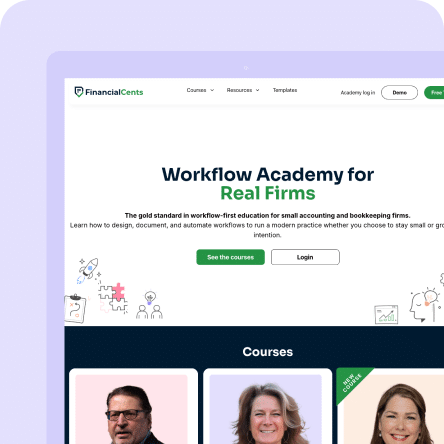Imagine running an accounting firm where every client you take on is the perfect fit. Where your processes run so smoothly that you save time, increase profits, and scale effortlessly. This isn’t a fantasy. It is what happens when you niche down and streamline your operations.
At WorkflowCon 2024, Zane Stevens, co-founder of Protea Financial, shared his blueprint for finding the right niche and optimizing the firm’s workflows. His company, a wine industry-focused accounting firm, went from generalist struggles to becoming a dominant force in their market. His strategy? Carve out a niche, optimize every process, and build a system that makes accounting firms efficient and scalable.
This article breaks down Stevens’ approach step by step, using his own words to illustrate key lessons.
The Power of Niching
Many entrepreneurs resist niching because they fear it will limit opportunities or reduce their potential client base. They believe that by casting a wider net, they will attract more business. But in reality, the opposite is true.
Zane Stevens learned this lesson firsthand when he started Protea Financial. At first, he and his team took on a broad range of clients—from attorneys to music festivals to beauty product companies. They were doing good work, but their firm lacked a clear identity.
“We didn’t say on day one we will only help wineries,” Stevens admitted. “But what we could show to people that were referral sources was that we work with wineries and we understand the space.”
Over time, it became clear that 70 percent of their clients came from the wine industry. Instead of resisting this trend, they decided to double down on it. This decision changed everything.
Why Niching Works
Niching allows accounting firms to move away from being generalists and toward expert status. It is the difference between being just another accounting firm and being the go-to accounting firm for the wine industry.
Stevens explained,
When we lost our largest non-wine client, it forced us to ask what we wanted our firm to look like moving forward. It became obvious we had created expertise in the wine space, and this was a niche we should follow through on."
This shift gave them several advantages:
1. Easier Client Acquisition
When you establish yourself as an expert in a specific industry, clients begin to seek you out rather than you chasing them.
“If I tell someone I’m an accountant, they ask what kind of accounting I do. But when I say, ‘I’m an accountant for the wine industry,’ suddenly it clicks,” Stevens said. “They know exactly who I serve, and it either applies to them or someone they know.”
Because Protea Financial specialized, they became the obvious choice for wineries looking for accounting services. They no longer had to compete with generic accounting firms.
2. Stronger Marketing and Branding
Marketing a generalist accounting firm is difficult. When you try to appeal to everyone, your message becomes vague. But a niche gives your firm a clear, laser-focused identity.
Stevens explained how this helped his firm:
Our messaging became simple. Accountant for the wine industry. If you go to my LinkedIn, it starts with that. It makes branding easy. I can put pictures of wine bottles and glasses on my pages. People instantly understand what we do."
By focusing on one industry, Protea Financial was able to:
- Create consistent messaging that resonates with their audience
- Attend industry-specific events where their ideal clients gathered
- Build a strong reputation within a targeted network
3. Higher Pricing Power
Specialists can charge higher fees than generalists. Clients are willing to pay more for expertise because they know they are getting a tailored, high-value service.
“If you niche, you’ve got a good chance of getting higher fees and revenues,” Stevens said. “You can show value. You can show them the impact you’ve had on previous clients. That allows you to set premium pricing.”
Protea Financial didn’t just provide accounting services—they provided accounting services specifically designed for wineries. This specialization justified their higher pricing.
4. Competitive Advantage
Niching creates an instant advantage over competitors who try to serve everyone. Instead of being one of thousands of generic accounting firms, Protea Financial became one of the largest winery-focused accounting firms in the U.S.
“As far as I’m aware, we’re one of the largest winery experts out there,” Stevens said. “Both in team size and client size. That gives us a competitive advantage because we can have conversations that most firms can’t even get in the door for.”
5. Better Client Relationships
Clients trust accounting firms that understand their unique challenges. When a firm specializes, it develops deep industry knowledge that makes client interactions smoother and more valuable.
Stevens illustrated this point with an example:
I can step in front of a winemaker and have a conversation in words they understand. Sure, we both speak English, but I speak accountant, and he speaks wine. Because I’ve been working in this space for so long, I’ve learned the language of wine."
This insider knowledge helped Protea Financial build strong relationships with their clients. It also reduced client turnover because wineries felt understood and valued.
6. Increased Efficiency and Scalability
Having a niche makes it easier to streamline operations because clients have similar needs. Accounting firms can develop repeatable processes instead of reinventing the wheel with each new client.
“If I have five clients in the same industry, I can standardize processes and roll them through,” Stevens explained. “But if I have five clients in different industries, I have to create customized reports and workflows for each one. That takes a lot longer.”
By focusing on wineries, Protea Financial was able to:
- Standardize financial reports and processes
- Train staff more effectively
- Scale the firm without adding unnecessary complexity
How to Find Your Niche
Many entrepreneurs struggle with choosing a niche because they fear making the wrong decision. Stevens had a clear message: You don’t have to choose a niche on day one.
“You don’t have to figure out your niche right away,” he reassured. “What I can say is to look at your past experiences to see where you have expertise. Figure out what you love doing. And if you have a passion for something, ask yourself—can I help people in this space?”
To help guide this process, here are the key steps to finding your niche:
- Analyze Your Experience
- What industries have you worked in?
- What knowledge or skills do you already have?
- Look at Your Existing Clients
- Who do you enjoy working with the most?
- Which clients are the most profitable?
- Identify Market Demand
- Are there underserved niches in your industry?
- What specific problems can you solve better than others?
- Test Before Committing
- Offer services to different industries before fully committing.
- Gather data on which niche is the most profitable and enjoyable.
- Shift Your Branding and Messaging
- Update your website, social media, and marketing materials.
- Position yourself as an expert in your chosen field.
Streamlining Your Accounting Firm’s Processes: The Key to Efficiency and Scale
Once an accounting firm finds its niche, the next step is optimizing processes to maximize efficiency and scalability. Without streamlined systems, businesses struggle with wasted time, miscommunication, and bottlenecks that slow growth.
Zane Stevens and his team at Protea Financial mastered this by implementing Standard Operating Procedures (SOPs) and leveraging automation to ensure smooth operations. The result was a highly efficient firm serving over 150 clients in the wine industry with a team of just 41 people.
“We standardized everything,” Stevens said. “If someone gets sick or leaves, another team member can step in and follow the process immediately. That’s how you scale without losing quality.”
This section breaks down Stevens’ approach to streamlining business processes, offering a step-by-step guide for any firm looking to increase productivity and growth.
Why Streamlining Matters
Many accounting firms rely on inconsistent processes, forcing employees to figure things out on their own. This leads to inefficiencies, errors, and unnecessary stress. A well-streamlined firm, however, enjoys benefits such as:
- Faster workflows because tasks take less time when following a structured system
- Fewer errors through standardized processes that ensure consistency and accuracy
- Higher productivity since employees spend less time on redundant tasks
- Easier scaling because new hires can integrate seamlessly without extensive training
- Better client experience since customers receive smooth, consistent service every time
Stevens emphasized that process efficiency is not just about internal benefits. It directly impacts revenue and customer satisfaction.
“The more efficient you are, the more time you create for high-value activities,” he said. “You can focus on business growth instead of firefighting daily problems.”
Steps to Streamline Your Accounting Firm’s Processes
Document Every Process
One of the biggest mistakes firms make is keeping processes in employees’ heads rather than writing them down. Without proper documentation, team members waste time reinventing the wheel whenever they perform a task.
Stevens and his team created SOPs for every aspect of their firm. They detailed everything from client onboarding to financial reporting, ensuring that every task followed a structured, repeatable process.
“Holding 150 clients means we have 10 processes each, and those processes look the same for every single client,” Stevens said. “That makes it easier for us if someone gets sick or leaves the company. Another team member can step in and immediately take over the work.”
To implement this in your own firm:
- Identify the most frequent tasks
- Write step-by-step instructions for completing each task
- Store these SOPs in an easily accessible location
- Regularly update them as processes improve
Automate Repetitive Tasks
Automation is a game-changer for accounting firms looking to improve efficiency. Stevens leveraged technology to remove manual bottlenecks and ensure tasks were completed with minimal effort.
“We focus on automation and technology integration to make our work easier,” he said. “The more we automate, the less room there is for human error and wasted time.”
Firms can automate:
- Invoicing and billing
- Appointment scheduling
- Email follow-ups and client communications
- Data entry and reporting
- Payroll processing
Using automation tools reduces the workload on employees, allowing them to focus on higher-value tasks that require human judgment.
Standardize Client Onboarding
Many accounting firms struggle with client onboarding because there is no consistent process in place. This leads to missed steps, frustrated clients, and a slow start to service delivery.
Stevens’ team streamlined their onboarding by creating a checklist that every new client followed. This ensured that nothing was forgotten and that clients received a smooth introduction to their services.
“If we can step in quickly and help clients efficiently, that’s a major win,” Stevens said. “A good onboarding process builds trust right from the start.”
To streamline client onboarding:
- Create a standardized welcome packet
- Develop a checklist for gathering necessary documents and information
- Set clear expectations and timelines for service delivery
- Use automation to send reminders and follow-ups
Train and Upskill Your Team
A well-documented and automated firm still relies on its people. Investing in training ensures that employees understand and follow the streamlined processes.
Protea Financial sends employees to industry-specific training to ensure they stay ahead of trends. This improves their efficiency and enhances their ability to serve clients.
“We require our teams to attend wine industry conferences regularly,” Stevens said. “They need to stay informed on the latest changes to provide better insights to our clients.”
To implement this:
- Identify the key skills your employees need to master
- Invest in industry-specific training and certifications
- Encourage continuous learning and knowledge sharing
- Monitor performance and provide feedback
Regularly Review and Improve Processes
A streamlined accounting firm is never static. As companies grow and industries change, processes need to be refined.
Stevens and his team committed to reviewing and updating their SOPs as part of their ten-year celebration. They analyzed every workflow to ensure it was as efficient as possible.
“If you can create efficiencies, you can create more available minutes in the day,” he said. “And those minutes can be used in any way you feel necessary—whether for firm growth or personal time.”
To keep processes up to date:
- Schedule quarterly or annual process reviews
- Gather feedback from employees and clients
- Identify bottlenecks and areas for improvement
- Update SOPs and automation tools as needed
The Impact of Streamlining
Stevens’ commitment to streamlining processes paid off in several ways:
- Increased profitability because tasks took less time and required fewer resources
- Greater scalability since they could serve more clients without adding excessive overhead
- Stronger team morale as employees had clear guidelines and less stress
- More freedom for Stevens and his leadership team to focus on strategy instead of daily operations
“Freedom means having time to coach soccer,” Stevens said. “Twice a week, I finish work at 3:30 PM and go straight to the field. That’s only possible because of the efficiency we’ve built into our firm.”
Streamlining is not just about working faster. It is about building a firm that runs smoothly, delivers better results, and allows its leaders to focus on what truly matters.
The Road Ahead
Niching and streamlining are not one-time actions. They are ongoing commitments. Accounting firms must continuously refine their focus, optimize their workflows, and ensure they remain the best at what they do.
Stevens’ final advice to those looking to niche and streamline:
Look at your past experiences to see where you have expertise. Figure out what you love doing. And if you have a passion for something, ask yourself—can I help people in this space? That’s where you’ll find your niche."
Following these steps will increase clarity, efficiency, and long-term success for entrepreneurs seeking to build a sustainable, scalable firm.






